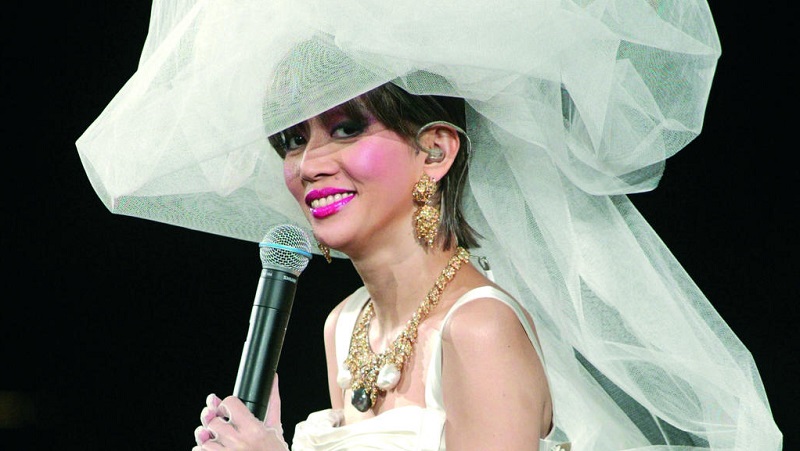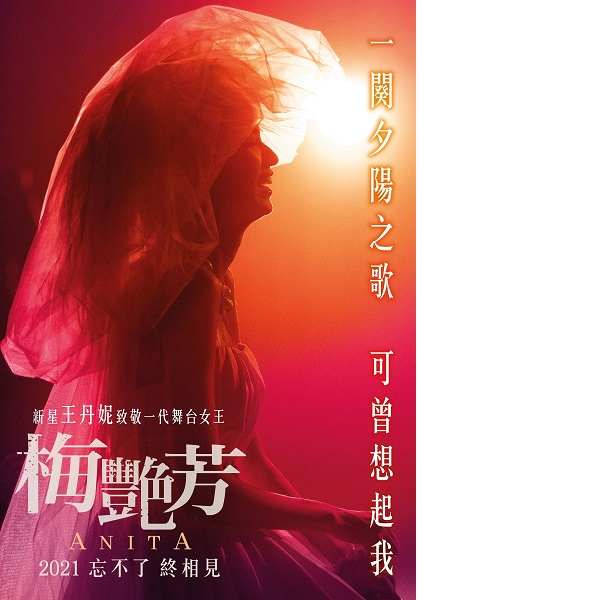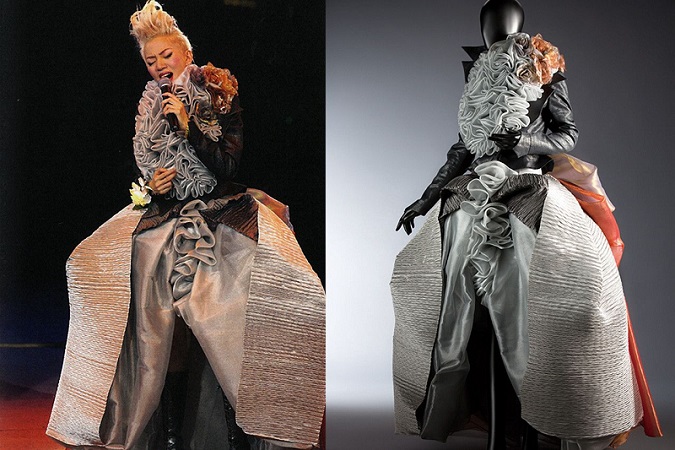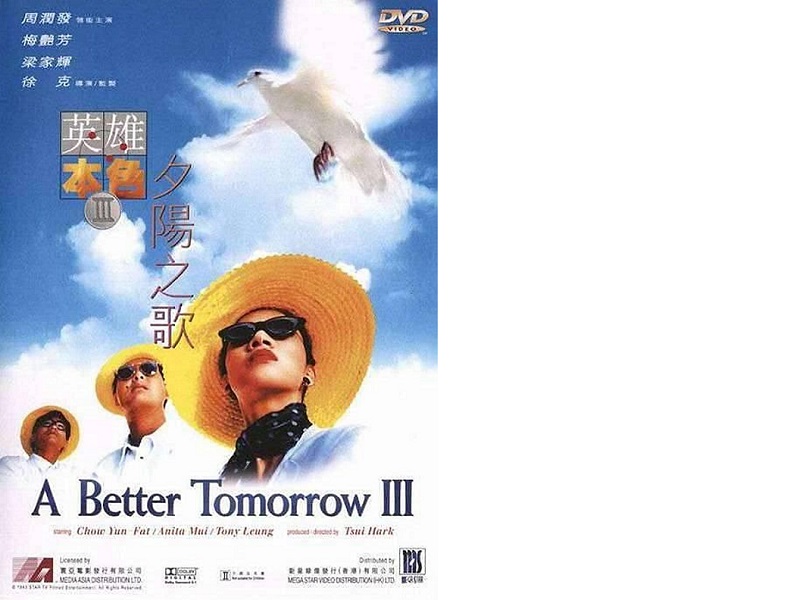Film Review: Anita (2021) A Sonic Imprint of Hong Kong’s Golden Era
– The biopic brings back the nostalgia of Hong Kong’s 80s & 90s
– The height of Cantopop portrayed through the lives of Anita Mui, hailed Madonna of the East.
– The biopic brings back the nostalgia of Hong Kong’s 80s & 90s
– The height of Cantopop portrayed through the lives of Anita Mui, hailed Madonna of the East.

Anita (2021) film by Edko Films.
Anita, a biopic on illustrious Hong Kong Cantopop diva Anita Mui set to premiere all over Southeast Asia this month, has aroused a revival of Cantopop’s most spectacular songwriting of the gangtai style; a musical genre that carries a sweet, love-song melody distinct to C-pop from the 80s and 90s. Not the least frivolous, the film has aroused strong sentimentality for the ‘daughter of Hong Kong’ among Chinese moviegoers and industry compatriots in the entertainment circles.
Anita tells the legendary and gaudy life of the late singer and actress. Beginning at the age of four, Mui’s singing career at amusement parks and later nightclubs and theatres in Hong Kong went on for another three decades, reaching far beyond including Taiwan, China, Singapore, and Malaysia. And selling out concert tickets as far as Hammersmith, London.
During my childhood growing up in Malaysia, I would hear her songs being regularly played on radios, annual festive shows on televisions, and even at the local karaoke party. Insignificant then, Mui’s voice was already forming part of the cultural identity quite unlike anything else, especially to Cantonese and Mandarin speakers in the region.

What immediately stood out was the constant musical numbers that remained so familiar to our ears. In a scene right before she competed at TVB’s first New Talent Singing Awards, Mui was having a conversation with her sister. Instinctively, they both knew that the song The Windy Season (風的季節) would be a great contending choice. Originally sung by Paula Tsui, the song eventually won Mui a contract with Capital Artists, a local record label. Played by Louise Wong, Mui’s character portrayed a sense of gullible charm found instinctively in a city port, not like others in the region. Wong, a full-time model prior to accepting the role as Anita, played a fitfully convivial character at the beginning of the film. Underwhelming at first, her role weaved a complex web dutifully emerging a soulful impression of the willful femininity of a star.
Each song, now inevitably classic to us all, drives the plot forward. Intersecting real-life performances, the story-telling placidly stops at some of Mui’s most disturbing and revolutionary times in her career. From recording her debut album Debts of the Heart (心債) for a television drama, to her first meeting with Eddie Lau and Leslie Cheung, Mui’s songs depict a beautifully melancholic journey of a rising star.
Resilience and insufferable dedication to creative endeavors are elements that persist. A dedication to her artistry, Wong’s role pursued a rebellious path, quite uncomfortable to watch. For the first time, Louise’s role seemed impervious. Almost belittling the competence of the producer that got her the role in the first place. Or perhaps, it has been the prodigious role of Mui that made it all quite inadequate whomever the casting director may have opted to play Mui. Being the legendary queen of Cantopop that she still is. In fact, it has been an aim even from the beginning of production that this project should be a launchpad to introduce a young and new cast list; an ever-increasing way to provide the opportunity to keep its screen fresh with talent.

However, whatever sluggishness or foible in acting that occasionally permeated, it is fully substituted by the skillful application of computer-generated images (CGI). In fact, it has been the green screens that have provided much of its nostalgic elements. The backdrop, featuring the atmospheric cityscape of Hong Kong’s past, followed a near accurate, historical reconstruction of an era no longer exists. Boisterous and progressive was Hong Kong in the past, and incomparably and even decreasingly ineffectual in its rigorous economical demand for such talent we see being exported out of Hong Kong today.
But what truly stayed impressionable is a near godly admiration for its fashion, most effectively towards Eddie Lau, Mui’s stage costume designer. Lau heralded the prominence, also in the fashion of the 80s and 90s era, of exaggerated shoulder pads seen in her rebellious performance of ‘Bad Girl’ and the wedding gown Mui worn on her last eight live performances singing Sunset Melody (夕陽之歌). Merging two artistry – a stage performer and immaculate designer material which adorned her – Anita Mui and Eddie Lau proved a successful partnership that continues to wow its audience even eighteen years after its last shows, thanks to Bill Kong’s release (Edko Films) of Anita’s 2021 biopic. One so truly deserving to be made.
The film ends with Louise’s rendition of Mui’s last live show singing Sunset Melody, a track from her 1989 album, In Brazil. The song, a Cantonese version of Koji Makaino’s Japanese version, was also used as a theme song for A Better Tomorrow III: Love & Death In Saigon (directed by Tsui Hark), a film that also saw leading roles played by Mui herself, alongside Chow Yun Fatt.

The biopic of Anita has opened a floodgate of old memories of a golden age, a bygone era that abruptly came to a halt when Mui announced her semi-retirement from the music industry in 1991, the year she turned 28. Hardly an age to retire in this day and age you may think. But between 1982 and 2003, the Cantopop diva has amassed a daringly huge singing and acting repertoire.
Her career came to an abrupt end in 2003 after suffering for years from cervical cancer and died at the tender age of 40.
Unfathomably familiar, still, are her songs some may say even after her death eighteen years ago. Anita’s voice is Hong Kong’s sonic imprint of the 80s and 90s.
Sony has picked up the rights to distribute Anita to five Asian countries including Thailand, Vietnam, Singapore, Thailand, and Malaysia, while Bill Kong’s Edko Films will distribute it to China and Hong Kong.
Production companies: Edko Films, Irresistible Films, Hua Xia Films, One Cool Film, CCC Media
Producers: Bill Kong, Ivy Ho, Tang Wai-But
Screenplay: Jack Ng
Cinematography: Anthony Pun
Editing: David Richardson, Ron Chan, Cheung Ka-fai. Yan Ting-ting.
Production design: Pater Wong
Reference:
Hong Kong Cantopop: A Concise History. Author: Yiu-Wai Chu. Hong Kong University Press, 2017.
https://www.wikiwand.com/en/Anita_Mui




